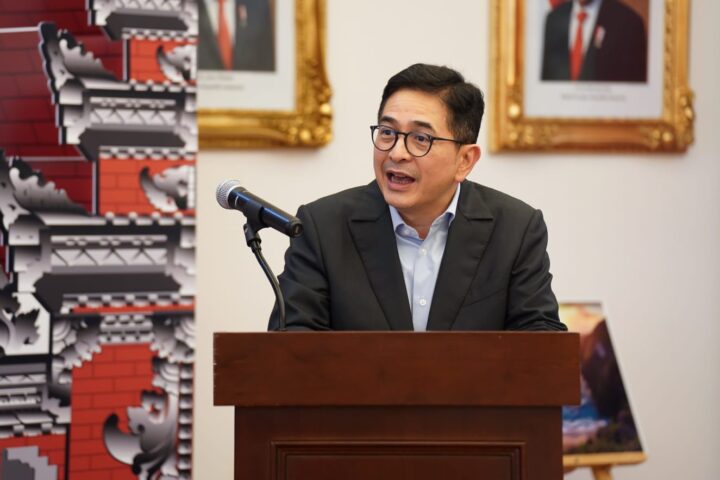
It is believed that ASEAN still needs to play its role in terms of intra-ASEAN trade and investment, bearing in mind the projected stagnation of the value of intra-ASEAN trade over the last two decades which has reached 22-23%. More specifically, the global trade of ASEAN countries has stagnated growth from 6.4% to 7.8%.
The stagnation that occurs is due to several things, such as most of the products made in ASEAN are substitute products, not value-added products. This resulted in limited opportunities to increase trade between members. In addition, non-tariff barriers (NTBs) and non-tariff measures (NTMs) are factors that can hinder trade. Finally, ASEAN must also realize that countries in the region must be integrated with one another, otherwise this will become an obstacle.
In response to this, the Chairman of the ASEAN Business Advisory Council (ASEAN-BAC), Arsjad Rasjid consistently emphasized all ASEAN countries to also continue to invest in the ASEAN region. Intra-ASEAN investment is the key to intra-ASEAN economic growth.
"ASEAN-BAC as a forum for the private sector and business in ASEAN, wants more investment to be present in the region. For this reason, we agreed to create a well-regulated trade and investment ecosystem in the region," said Arsjad.
Arsjad also stated that ASEAN is a dynamic trade and investment center, and has the potential to exploit large natural and human resource wealth. “Looking at the existing data ASEAN has a combined GDP of more than 3 trillion US dollars and FDI of more than 170 billion US dollars. In addition, in terms of ease of doing business, data from the World Bank shows that ASEAN countries such as Singapore, Malaysia and Thailand are ranked in the top 25," said Arsjad.
ASEAN's homework is how this ease of trade and investment can be enjoyed by all countries in the region and together achieve the desired economic growth.
Solutions to Face Challenges
Overcoming this, ASEAN-BAC has identified one of the priority issues regarding trade and investment facilities. Through this priority issue, a legacy project called ASEAN Business Entity was developed. Through this legacy project, it is hoped that various intra-ASEAN investments will grow which will be able to provide special facilities among countries in the region, thereby encouraging economic growth in the region.
"NTBs and NTMs are one of the trade issues in the region, this is what we want to resolve through this legacy project," said Anne Patricia Sutanto, Policy Manager for the ASEAN-BAC Trade Facilitation.
Initiatives to promote intra-ASEAN trade have been selected for example in sectors such as new and renewable energy, electric vehicles, food and beverages, textiles, and finance. ASEAN-BAC is also focusing on enhancing and harmonizing trade agreements, including ATIGA, RCEP, and ASEAN Plus FTAs. For all of this to be done, the emphasis on regulatory aspects is again very important.
"Working with governments, ASEAN-BAC has embarked on several initiatives, including reforming the legal and regulatory framework to provide equal tax treatment for startups, encouraging intra-ASEAN investment, updating licensing requirements, and reducing compliance costs," said Roderick Purwana, Policy Manager for Investment Facilitation.
Bernardino Vega as Deputy Chair of ASEAN-BAC also added that ASEAN Business Entities are trying to make the cost of doing business in the region lower.
“ASEAN Business Entity offers a solution if an entrepreneur has established an ASEAN company in an ASEAN country, his establishment permit can also be legalized in other ASEAN countries, without the need to register his business entity again. So, the cost of doing business will be lower. This will increase incentive initiatives to invest inter-ASEAN," said Dino.
With regulations that make it easy to invest and trade between ASEAN countries, this can trigger regional economic growth. Collaboration between companies in the region will also be created and the principle of this collaboration has also been carried out by various large companies such as PT Astra International Tbk., Sinar Mas, Indika Energy, Bakrie Group and Mayora Group.
Sinar Mas continues to strive and contribute in supporting the ease of doing business in the ASEAN region. "Easy to invest is the key to successful regional growth," said Franky Oesman Widjaja, Chairman and CEO of Sinar Mas Agribusiness & Food.
Indika Energy is also ready to invest in the ASEAN region and support ease of doing business in the region. “As an investment company with a diversified business portfolio, we know ASEAN has great potential to become a new and renewable energy supply chain. For this reason, Indika is also ready to encourage its utilization by prioritizing sustainable processes," said Azis Armand, Deputy Main Director and CEO of Indika Energy Group.
###
National Economy
Regional Economy
National Economy
Regional Economy